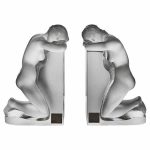Bidding, Security & Auction Rules
Dear Lee,
Last month, I talked about my preparations to sell some of my enamels collection. I chose the auction route. Sellers need to research to find the right auction house, make sure they set aside some of the collection for friends and family, and of course, ask questions (preparation, delivery and fees, for example) before signing any legal papers. Set a date for the sale and most important, ask how soon after the sale you get paid! But what are the rules for bidding, pricing and unsold items? That knowledge is vital.
Price estimates are often set low to encourage bidding. Online bids by early birds are entered before the sale and entered automatically by phone or computer up to the highest bid during the sale.
It is the auction house’s responsibility, not yours, to follow all the laws, especially those that regarding endangered species or anything containing ivory. States have their own laws about selling whiskey, drugs, some plants and trees, historic items, human parts and more.
You are not legally allowed to bid on your own items or ask someone else to bid for you. If there is an argument about the bidding, the auctioneer rules.
If you can give permission to the auction house to put it in an after-auction sale with corrections and an adjusted price. Possible reasons for this: if anything is left after the sale because a bidder didn’t pay, if there is a problem with a description, or if an expert determines something is a fake.
Think of your auction items as dollar bills. You wouldn’t leave piles of money on a table with strangers. You expect workers in your house to have been checked for honest and safety, and it’s the same for auction house employees. Get short-term insurance against damage or theft. Make sure your collection is safe, whether it is still at your house, or when the auction house delivers it to the auction location.
Take pictures of each item to be sold. Compare your pictures to the photographs and descriptions in the catalog sent to you ahead of time by the auction house. When I saw the rough draft of my catalog, I checked each piece against my pictures and found one thing missing. The auctioneer had taken it out of the sale because it was similar to another expensive piece. It will be sold next time.
My sale went well. Only four pieces went below estimate and a few were double or triple estimate. The auction experts recognized several of my enamels as European and Asian. I only knew they were not typical USA pieces.
In summary, if you are thinking of selling a collection at an auction, do your research, keep track of every item, be mindful of security, and familiarize yourself with auction rules and regulations. Online auctions have opened selling to a world of buyers sitting in their own living rooms and bids have been high. That’s good for you!
One response to “Bidding, Security & Auction Rules ”
Leave a Reply
You must be logged in to post a comment.




Thank you Terry. As usual your ‘ Letter to Lee ‘ contains an enormous amount of Wisdom, useful to anyone engaged in collecting, and especially selling, Antiques.
Thank You Again, and Good Luck to you in your next endeavor. I’m sure you’ll have one, because I just can’t imagine you sitting in a rocking chair and quietly growing old.
Thank you again.
G.F. ‘Frank’ Brown (Hookman)